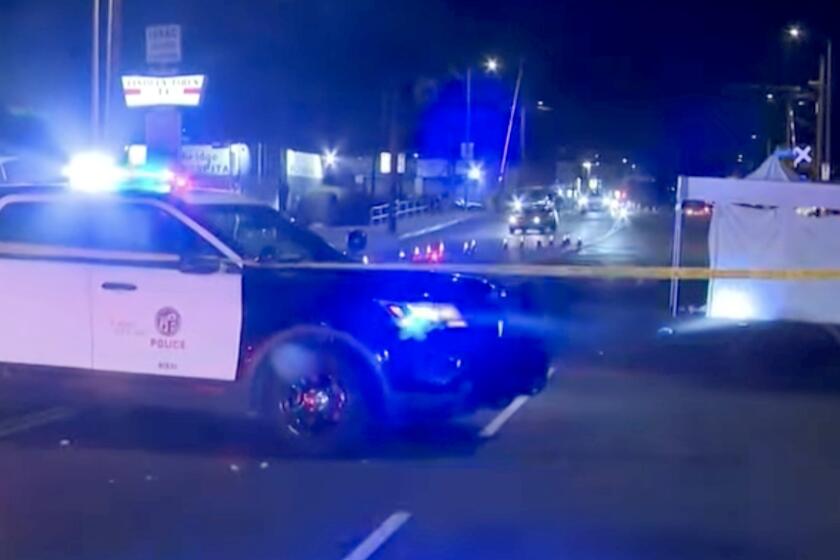Handler of Alleged Spy Cuts Plea Deal
Former FBI counterintelligence supervisor James J. Smith was expected to plead guilty today to lying to the federal government about his affair with accused Chinese double agent Katrina Leung, sources said Tuesday.
In exchange, federal prosecutors will drop one count of mail fraud and three counts charging the veteran Los Angeles FBI agent with gross negligence in allowing Leung access to classified documents, sources said.
While there was no specific agreement on sentencing, it is possible that Smith, 60, will not serve any time in prison.
The proposed plea agreement, to be brought before U.S. District Judge Florence-Marie Cooper, comes just over a year after Smith and Leung were arrested in a scandal that embarrassed the FBI and led to a sweeping overhaul of its counterintelligence operations.
The arrests last April followed a year-long investigation that determined that Leung, a longtime FBI informant and prominent Chinese American businesswoman, carried on romances over a 20-year period with Smith and William Cleveland, another former FBI counterintelligence supervisor in San Francisco.
Cleveland was never charged in the case but resigned his sensitive post at the Lawrence Livermore National Laboratory the day after Smith and Leung were taken into custody.
The arrests were particularly galling to many national security officials when it was later disclosed that top FBI counterintelligence officials were told a decade ago that Leung may have had unauthorized contacts with Chinese intelligence agencies, but decided to allow Smith, her longtime “handler,” to take care of the matter.
Leung is charged with five counts of illegally copying and possessing national security papers that could harm the United States. Leung has always maintained that she was acting under instruction from Smith and other FBI agents in her dealings. Her attorneys had no comment Tuesday on the possible plea agreement for Smith.
For 20 years, Leung was known by the code name “Parlor Maid” and was considered to be among the bureau’s most important counterintelligence sources on China. Her information made its way to the highest levels of government, earning Leung about $1.7 million.
Smith, who retired from the FBI in 2000, spent 22 of his 30 years with the FBI assigned to its Chinese counterintelligence squad in Los Angeles.
It was not long after he joined the squad that Smith recruited Leung as an informant. Federal authorities allege that a decade or so into that association, Leung also began working for the Chinese government.
At the time of their arrests, authorities alleged, Smith and Leung had engaged in a series of deceptions or inappropriate behavior in their handling of highly sensitive documents.
A counterintelligence agent reported seeing Smith on at least one occasion in 1999 check out a top-secret document from the bureau’s vault in Los Angeles and not return it until a day or two later, according to an affidavit. “No other FBI personnel ever retained top-secret documents overnight that they had checked out,” an agent wrote in the affidavit.
In searching Leung’s San Marino home, FBI agents said, they recovered a 1997 FBI memorandum on Chinese fugitives that was classified secret, as well as two directories of FBI personnel and a telephone list related to an FBI investigation with the code name “Royal Tourist.”
That list related to the six-year investigation of Peter Lee, a TRW Inc. physicist who pleaded guilty in 1997 to providing Chinese scientists with classified information about nuclear weapons. The document, authorities say, included a list of agents assigned to the case, their work assignments and their office, home and cell phone numbers.
Before her arrest, according to the FBI, Leung told agents that Smith would allow her to review classified documents but he never allowed her to keep them.
Instead, she said, she would “surreptitiously” copy documents taken from Smith. The agent allegedly was so careless about documents that he would leave his briefcase unattended and open, enabling Leung to see and copy papers without Smith’s knowledge.
During its investigation, the FBI received approval from the top secret Foreign Intelligence Surveillance Court in Washington, D.C., for covert searches and extensive surveillance of locations where Smith and Leung would meet. The sites included a hotel where the two allegedly had sex.
In November 2002, according to documents, FBI agents staged a covert search of Leung’s luggage at Los Angeles International Airport before she flew to China. In the luggage, authorities said, agents found a fax from Smith to Leung, as well as six photographs of a meeting of the Society of Former Special Agents of the FBI.
On her return, agents conducted another secret search of her belongings and the photographs were missing, according to court documents.
Like Los Angeles case two decades ago of then-Agent Richard W. Miller, the first FBI agent ever charged with espionage, Smith’s arrest embarrassed not only the FBI but its Los Angeles office, the bureau’s third-largest. It also prompted lengthy internal audits of FBI counterintelligence operations in L.A. and San Francisco.
The case also has led to new FBI regulations tightening monitoring requirements on counterintelligence agents and their sources, as well as greater oversight of agents who monitor foreign governments.
Authorities have concluded that the Smith case did not appear to result in the death or disappearance of any FBI informants.
More to Read
Sign up for Essential California
The most important California stories and recommendations in your inbox every morning.
You may occasionally receive promotional content from the Los Angeles Times.










